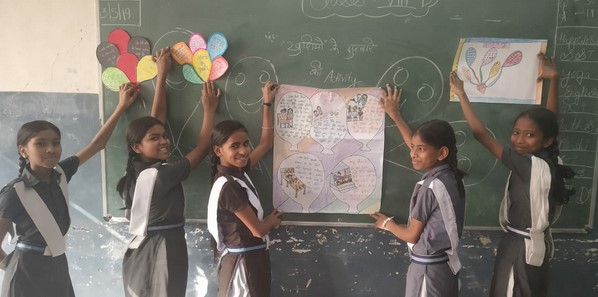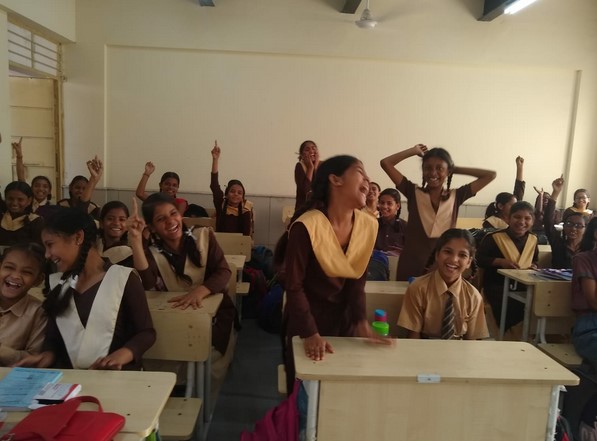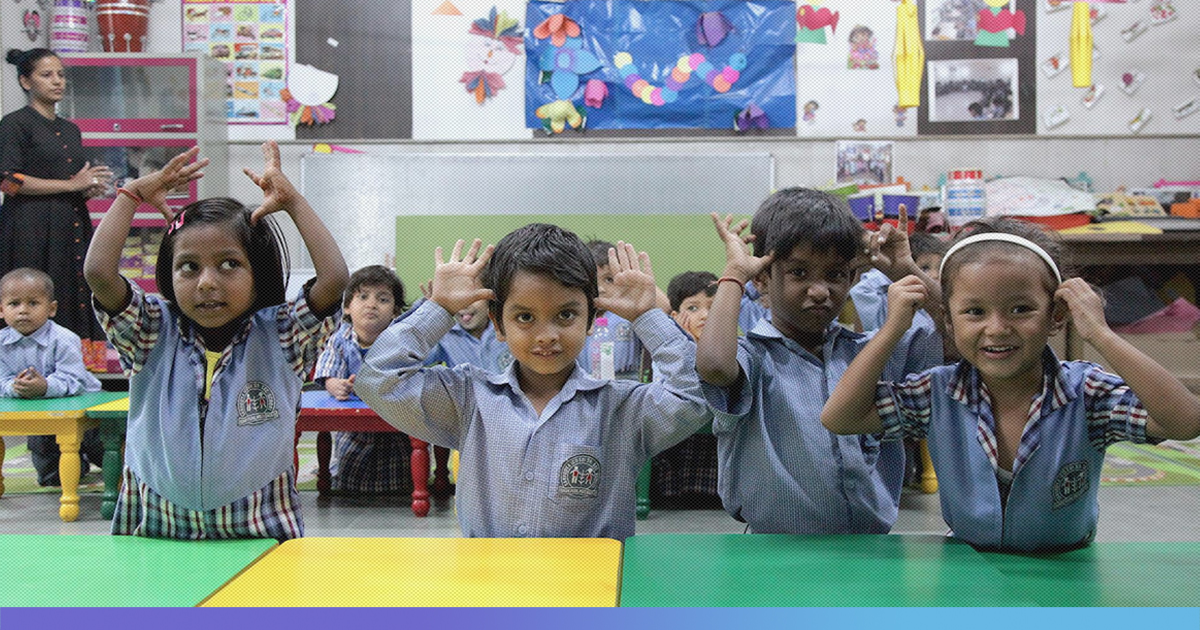Somnath is a 13-year-old boy studying in a Delhi Government School in Munirka. His father used to say on multiple occasions that Somnath has always been a stubborn kid and would create havoc if his demands were not met. Last month, something strange happened. Somnath started writing ‘Thank You’ notes to his father. In one of the notes, he had mentioned that he doesn’t want a new school bag. His father said with a deep sense of gratitude, “He’s been pestering me for a bag for the last 3 months. All of a sudden, he doesn’t want the new bag now. I was shocked and joyed at the same time”.
The cause of this magic is the ‘gratitude activity’ that Somnath did in his classroom and whereupon he self-reflected and realized how ungrateful he was towards his father and inconsiderate towards the daily struggles his father go through to fulfil his demands.
This activity is a part of the Happiness curriculum, which is being implemented in the Delhi government schools for the last one year. As part of the curriculum, the students in grades 1-8 are engaged in self-awareness processes of mindfulness, reflection activities, storytelling in the first period of every school day. There is a specific focus on cultivating the values and skills in the children which will help them to lead empowered lives and the programme has consequently resulted in numerous such success stories as Somnath’s.

Researches have consistently proved that to excel in this world and make it a better place, our students need the knowledge, attitude and skills to manage emotions, set and achieve goals, demonstrate empathy for others, maintain positive relationships, make responsible decisions to name a few – all of which are a critical part of social and emotional learning. One can’t write enough to highlight the importance of Social and Emotional Learning (SEL) in today’s fast-changing world.
The immediate success and the long-term potential of Happiness Curriculum is such that Andhra and Uttarakhand governments have taken a cue from Delhi Government’s initiative and have launched their own curricula focusing on ‘happiness”.
Lost in space
Proverbially, the hopes of the nation were hinged on the National Education Policy which took almost 4 years to come to its current shape and is now in the public domain for suggestions and feedback. To say that the hopes have been completely shattered in the draft, wouldn’t be an exaggeration. In the page no 25 of the draft policy, it is mentioned that “Students must develop not only cognitive skills…, but also social and emotional skills, also referred to as ‘soft skills’, including cultural awareness and empathy, perseverance and grit, teamwork and leadership, among others. The process by which children and adults acquire these competencies is also referred to as Social and Emotional Learning (SEL).” And rightly so.
However, after that initial spark, SEL finds only one mention in the 480 pages long draft. In the same paragraph, there are few examples of activities to promote SEL, which could have been gathered from a simple google search. From a naïve perspective, a simple measure of the seriousness accorded to SEL is the space provided to it in the policy draft. In the lengthy document, different branches of SEL (ethical and moral reasoning, communication) do find mentions sporadically. However, the document doesn’t draw a cogent picture of the integration of SEL in our education system.
The roadmap to SEL
Many of the influential Indian thinkers and educators like Gandhi, Tagore, Krishnamurti have always accorded high importance to the integration of SEL in the education system. Along with the vision, they also talked about the roadmap to prioritise SEL in classrooms. In the current world, countries like Finland, Singapore, Denmark, which are known for their robust education systems, have included SEL as part of their core curriculum.
From the last couple of years, numerous agencies have done commendable research around the integration of SEL at a systemic level. Organisations like CASEL (Collaborative for Academic, Social, and Emotional Learning), OECD (Organisation for Economic Cooperation and Development), Aspen Institute have consistently highlighted the approaches to integrate SEL in the education system.
The first step is to design a comprehensive curriculum which can be integrated into daily classroom instruction using interactive pedagogy. In India’s context, NCERT is equipped to create a national curriculum which can be later customised by state bodies (SCERTs) as per their context. It’s extremely important to keep the curricular structure experiential so that our youth, especially the students know how to facilitate their personal transformation based on heightened self-awareness from time to time rather than mugging up concepts of SEL. Delhi’s Happiness Curriculum is a case in point, where there are no books for the students and the whole curriculum is premised on reflective and experiential activities and stories.

The second step is to equip the system by their adult capacity which will equip them to achieve their goals later on and effectively tackle challenges as they come. This would require capacity building of not just educators and school leaders but also educational administrators and very importantly, parents also. It’s become imperative to develop the socio-emotional competence of the educators so that they are able to role-model for their students. It would be worthwhile if Social and Emotional Learning becomes an integral part of all kinds of pre-service and in-service training for teachers.
The last step is to create an evaluation and assessment framework which can reliably monitor the progress of the students in terms of their socio-emotional development. This would also help in looping back the feedback from the ground to the overall SEL framework. The policy draft has categorically mentioned the hazards of current assessment systems in our school. An SEL based assessment will be more of a feedback than a judgement and will align well with the vision of easing the burden on our young children.
Dropping the ball
After years of hard work by millions of people involved, India has reached a stage where access to schools doesn’t remain our primary concern. The moment is quite opportune to push for quality education and redefine the meaning of education to suit the 21st century needs. More than ever before, education needs to cater to the uncertainty of this fast-changing world, in the face of rapid scientific and technological changes, unprecedented socio-economic challenges and stunning socio-political reforms.

The NEP committee has one golden opportunity to be bold and chart a roadmap for SEL in Indian schools. Unfortunately, for the reasons unknown, it didn’t live up to its expectation in the policy draft. There is still time to work on it and include it in the final policy. It still has time to be courageous and work to build an India where every student has “independence of thought and action, sensitivity to others’ well-being and feelings, learning to respond to new situations in a flexible and creative manner, predisposition towards participation in democratic processes, and the ability to work towards and contribute to economic processes and social change”, as the aim of education is defined in the National Curriculum Framework, 2005.











